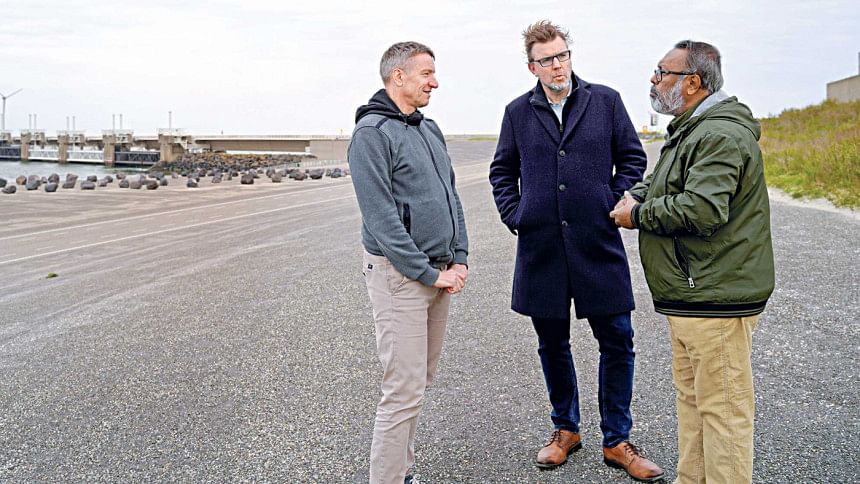BDP 2100: Seed of change

The international conference on 100-year Delta Plan 2100 (BDP 2100), which began yesterday, is ending today (May 27). The outline of the conference is to focus on issues and challenges regarding implementation of BDP 2100. Several workshops, high-level meetings and keynotes by leading officials from the government, private sectors and international partners are being presented during the conference. To address the long-term strategy, BDP 2100 has taken several angles, including two national strategies like flood risk management and freshwater supply. Alongside several sub-strategies there are six hotspot strategies as well. The hotspots are coastal areas, barind region, drought-prone areas, haors and flash flood areas, Chattogram Hill Tracts, river system, estuaries and urban areas. There are seven thematic strategies that include sustainable land use and spatial (three-dimensional) planning, agriculture, food security, nutrition and livelihoods, transboundary water management, dynamizing inland water transport system, advancing blue economy, renewable energy and earthquakes. Future concerning issues like climate change, economic growth, population growth and transboundary are also being discussed.
The thematic session on agriculture, water and climate condition is to explore the possible policy option for enhancing the potential growth of Bangladesh's farming sector. The session on valuing water addresses the options that could be leveraged to promote proper water valuation and its utilization. Funding and socio-economic development of Bangladesh are also the major concerns. The conference is an initiative of five renowned partners: The World Bank Group, Asian Development Bank, Japan International Cooperation Agency, the Embassy of the Kingdom of The Netherlands in Dhaka and the EU Embassy in Dhaka. The Conference Organizing Committee consists of Government of Bangladesh (GoB) representatives from GED and other institutions, while Delta Governance Council is involved in guidance and decision making.
I went to the Netherlands at the end of last month and saw their activities regarding the Delta Plan, technology-based agricultural innovations, value of organic farming and water. I was invited by Netherlands Water Partnership (NWP) and His Excellency Anne van Leeuwen, honourable ambassador of the embassy of the Netherlands in Dhaka.
On a windy day, I went to Delta Works, part of the Netherlands' Delta Plan, near a huge storm surge barrier along with Delegated Representative of Water, working at the Netherlands Embassy in Dhaka, Martijn van de Groep and Business Relations and Acquisition Manager of Netherlands Water Partnership Arjan Braamskamp. "I think, the aspect that needs to be considered in implementing Bangladesh's Delta Plan is the conventional policy plans in Bangladesh, which flow from top to bottom, can be more advantageous if flowed from bottom to top," Martijn van de Groep said.
In 1953, the Netherlands witnesses a disastrous flood, which caused economic losses worth around 5.4 billion euros. At that time around 2,000 people lost their lives, while many buildings and houses were damaged and numerous cattle and poultry died. Afterwards, the Dutch government thought about the Delta Plan, aiming how they can protect the Netherlands from further flooding, storm surges and othe natural disasters. They built several
barriers, dykes, barrages, and sluice gates which all work together to protect the country that has achieved economic prosperity by implementing their Delta Plan. Now, the country's yearly export of farming products is around 105 billion euros. The Netherlands is hugely supporting Bangladesh to implement the 100-year Delta Plan.
I went to see the Maeslant Barrier at the Hook of Holland. There is no such barrier in the world as huge as Maeslant, which is a fully automated and capable of withstanding a storm tide of 5 metre above Normaal Amsterdams Peil (NAP), a vertical datum. On an average, whole of the Netherlands is three metres below the sea level and it means if they could not rule the seas and the rivers water would have flooded the whole country. The barrier was established to save Rotterdam from storm surges and floods. You know many regions of our country remain inundated for long when floods or flash floods occur and we can't even protect ourselves.
I talked to Jouke Heringa, senior lecturer & researcher at HZ University of Applied Sciences, about their research and development on the blue economy, specially oyster farming. The Yerseke region is famous for oyster cultivation. It is a big commercial area as tourists love to eat the quite costly oysters. "After meeting the local demands, we now export oysters to the United States, China and many other countries," Professor Jouke said. Bangladesh can also work like this and take our blue economy quite far.
Dear readers, one of world's ranked agricultural universities Wageningen University of the Netherlands is also adding contribution to Bangladesh's Delta Plan with their unique research and advocacy support. When I went there, I was amazed to see their extensive research on farming and water-related works. There are around 600 Bangladeshi students in the Netherlands who will contribute to our farming sector in near future.
Senior Researcher, Water Management in Deltas at Wageningen University Catharien Terwisscha said, "Bangladesh is moving quite well towards development. We'll always work together with Bangladesh as we have been instrumental in the development of many deltaic regions.

Senior Policy Advisor, Food and Nutrition Security of the Netherlands Embassy in Dhaka, Osman Haruni said, "The Netherlands is ready for all kinds of cooperation, starting from business relationship to exchange of knowledge between academic institutes."
With the leadership and guidance of Prime Minister Sheikh Hasina, the inter-ministerial relationship has to be strengthened to execute the 100-year Delta Plan in Bangladesh. Netherlands have overcome the loss, caused by the devastating flood, only by executing their Delta Plan. At this stage of climate change, if we work closely on Delta Plan and water management, we'll definitely see a better farming future. We need to have a safe, climate-resilient and prosperous delta. Coordination among implementing institutions and grassroots level projects has to move further so that we can see the development in the next five years. Besides, sectoral policies and strategies should work efficiently to implement BDP 2100. The conference is going to end in a few hours and I firmly believe this is a great start. I am pretty sure that we will give 100 percent to materialize the 100-year Delta Plan of Bangladesh.

 For all latest news, follow The Daily Star's Google News channel.
For all latest news, follow The Daily Star's Google News channel. 




Comments